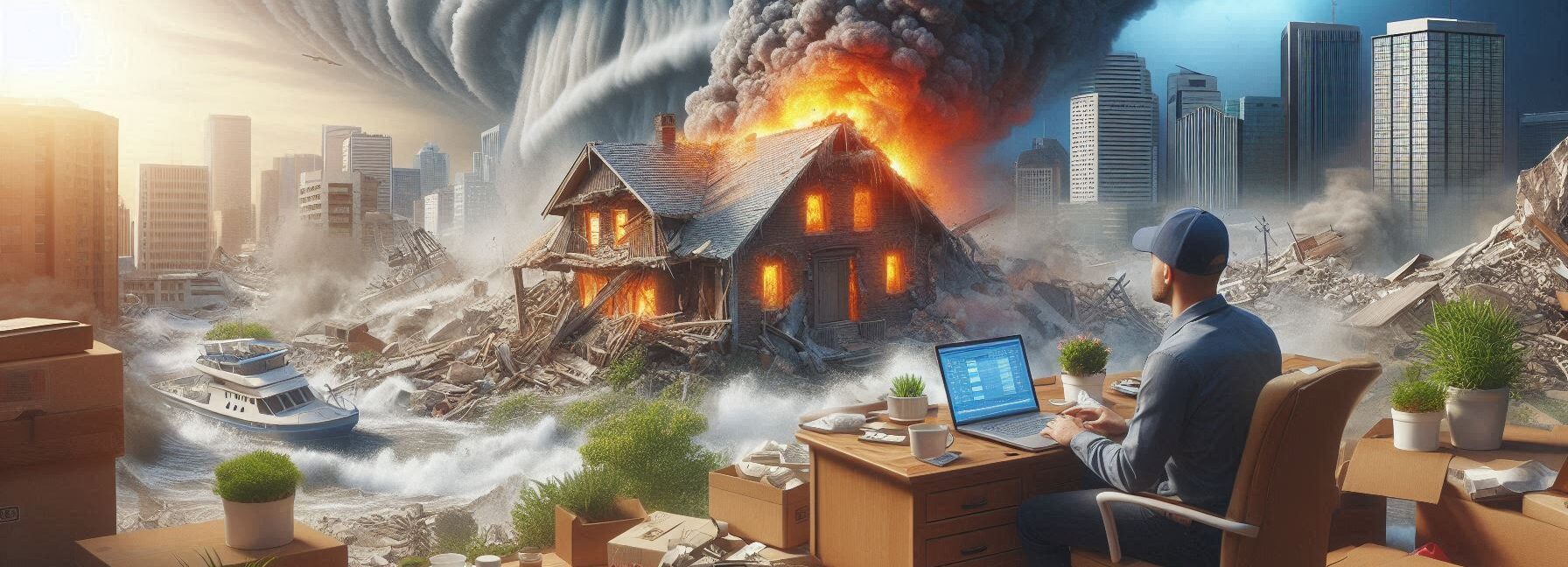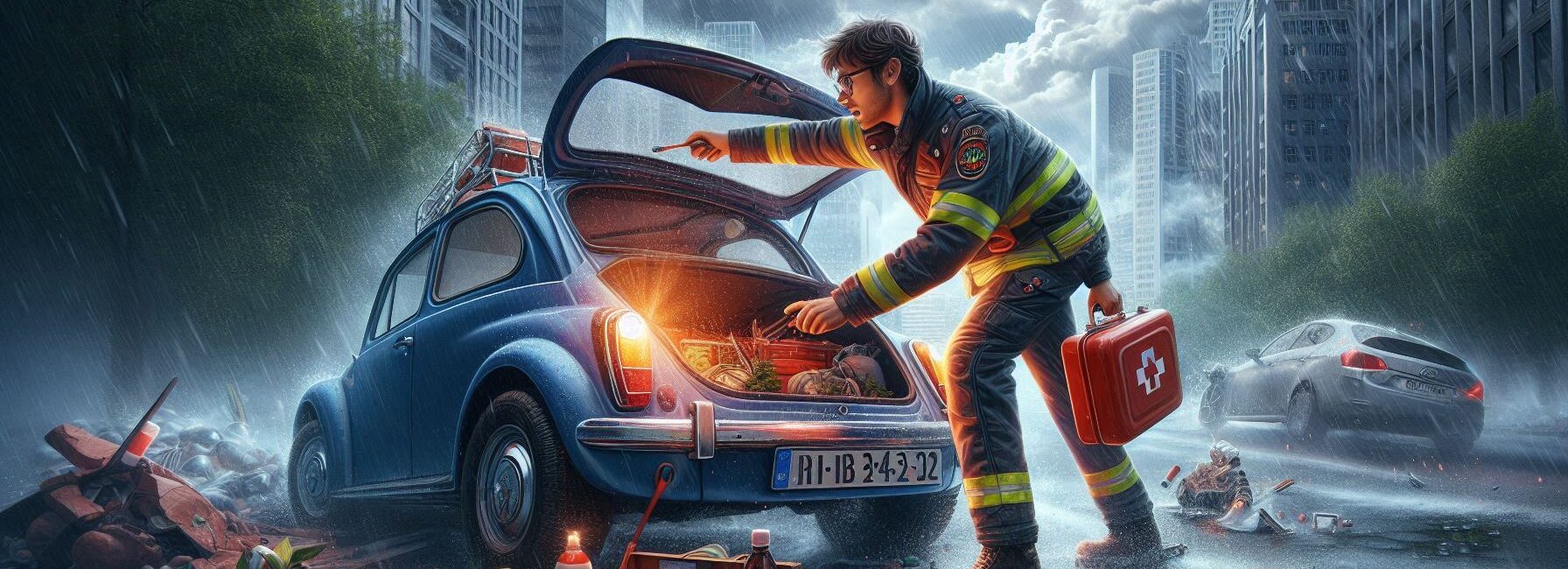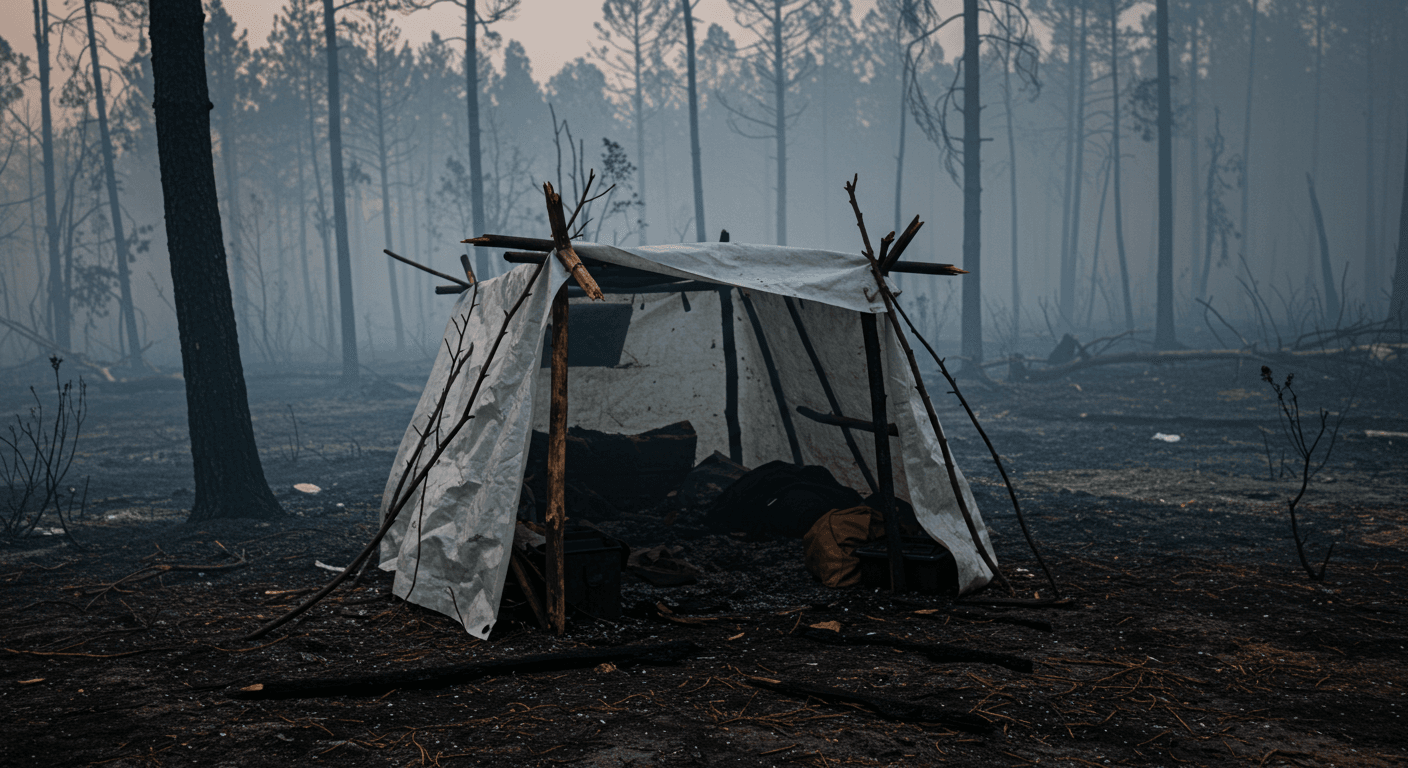Last Updated on November 1, 2025 by Kevin Collier

Top Takeaways and Key Concepts
- Choose Appropriate Containers: Use red containers for gasoline, yellow for diesel, and blue for kerosene.
- Add Fuel Stabilizer: Incorporate stabilizers to extend fuel shelf life up to 12 months.
- Store in Cool, Dry Locations: Keep fuel away from heat sources and direct sunlight to prevent degradation.
- Maintain Ventilation: Ensure storage areas are well-ventilated to prevent pressure buildup and reduce fire risk.
- Regularly Rotate Fuel Supply: Use and replace stored fuel periodically to maintain freshness and effectiveness.
Please Note: This post may contain affiliate links. If you click one of them, we may receive a commission at no extra cost to you. As an Amazon Associate, I earn from qualifying purchases.
Let’s be real for a second. When things go wrong, the last thing you want is to be running around like a headless chicken. You need fuel. Fuel for your car, the generator, maybe even that camping stove tucked in the corner. You know, the one you forgot about?
You’ve got to plan ahead. Take a deep breath. Picture your garage, but not like a disaster zone. You want it organized, right?
Start by finding some good containers. Strong cans are key. Try not to use old soda bottles. They might leak. You want something that’ll keep the fuel safe. Look for ones made for gas. You can find them online or at the store.
Next, think about how much you need. It’s easy to go overboard. You don’t want your garage to look like a scene from a scary movie. Keep it reasonable. Maybe a couple of cans for your car. A few more for the generator. And, hey, don’t forget that camping stove. It might just save the day.
Find a cool, dry place to store everything. Heat and sunlight aren’t friends with fuel. They can be tricky. You want it to last, right?
Label each container. Write down what’s inside and when you filled it. You don’t want to forget. It’ll save you headaches later.
When disasters happen, folks look for help. If you’re prepared with fuel, you can also help out neighbors. It could be a chance to connect, share, and support each other.
*** Shop for Survival Gear - Tools - Kits ***
Survival Gear - Bags and Backpacks - Knives - Boots/Footwear - Communication
Outdoor Cooking - Gloves - Hydration - Dry Boxes - Water Filtration Systems
Tents - Sleeping Bags - First Aid Kits - Multi-Tools - Flashlights - Fire Starters
Navigation - Survival Food - Night Vision - Headlamps - Stun Guns - Binoculars
Take your time. This isn’t a race. With a little planning, your garage can be a safe haven, not a chaotic mess. Getting ready can feel empowering. You’re setting yourself up for success, and that feels pretty good. Here’s to being ready when things get a bit wild!
Understanding Your Fuel Needs: What Are You Really Preparing For?
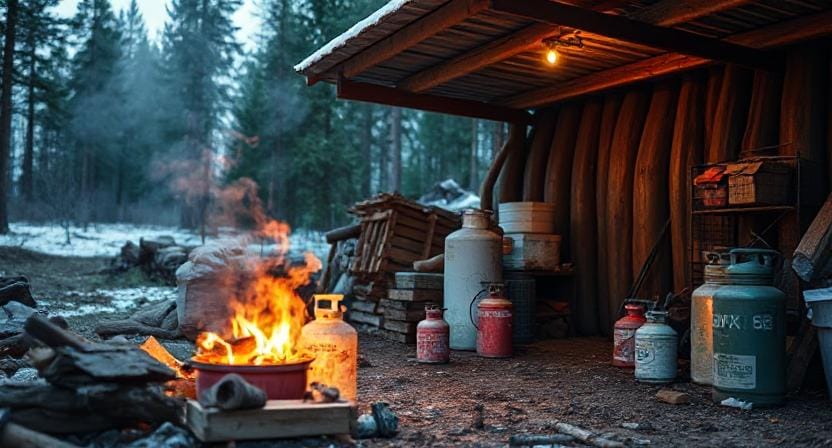
Before we start stockpiling gas like it's going out of style, let's find out what kinds of emergencies we're getting ready for. Is it a hurricane, an ice storm, or just a long power outage during football season?
Honestly, understanding what you're getting ready for can help you figure out what kinds of fuel you'll need.
For example, if you want to live off the grid in the woods (or just get through a week without power), you'll undoubtedly need propane to cook and heat your home.
If you want to get out of town faster than your neighbor's cat during bath time, though, gasoline is the way to go.
Now that we've talked about that, let's talk about how much gas you'll really need. A reasonable rule of thumb is to try to have enough to last at least two weeks of normal use. But keep in mind that this isn't “Survivor,” and you don't have to show off your survival skills. Just make sure you have enough fuel stored up!
Choosing Your Fuel Types: The Good, The Bad, and The Smelly
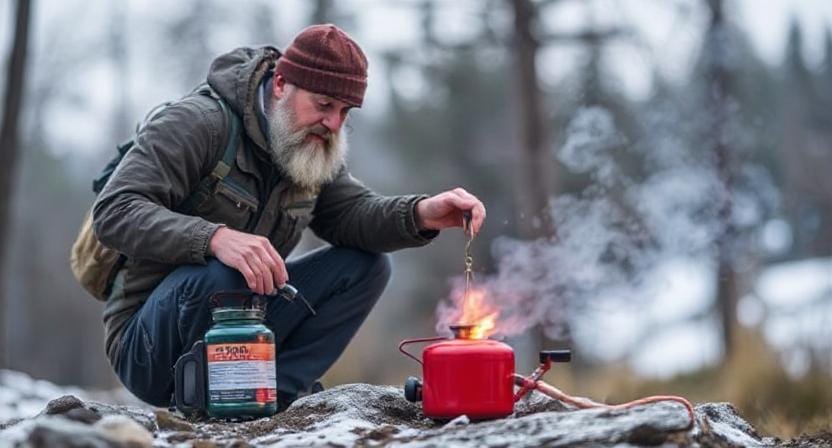
Now that we know what we need, let's talk about the different kinds of fuels that are out there. There are a lot of people who want to win in this area! Gas? Check! Diesel? Check again! What about propane? Of course! It's like choosing pals based on what snacks they like; each has its own benefits and downsides.
Gasoline can be used in a lot of different ways, although it doesn't last long (typically only three months unless handled). That's OK if you use it a lot in a generator or car, but what if you don't? Well, you might as well keep it in the fridge next to yogurt that has gone bad.
Diesel lasts longer than gasoline and is often more efficient. This is wonderful if you have a diesel car or want to use equipment that operates on it. Also, did I say that diesel engines are more reliable in cold weather? Talk about beating the winter blues!
Another good choice is propane because it doesn't go bad over time and can be safely stored indoors (as long as there aren't any open flames nearby—sorry barbecue aficionados!). It's fantastic for cooking and heating, but you need special tanks for it. And let's be honest, a full gas tank may feel like finding riches when the power goes out!
Where to Keep Your Fuel: Safety First!
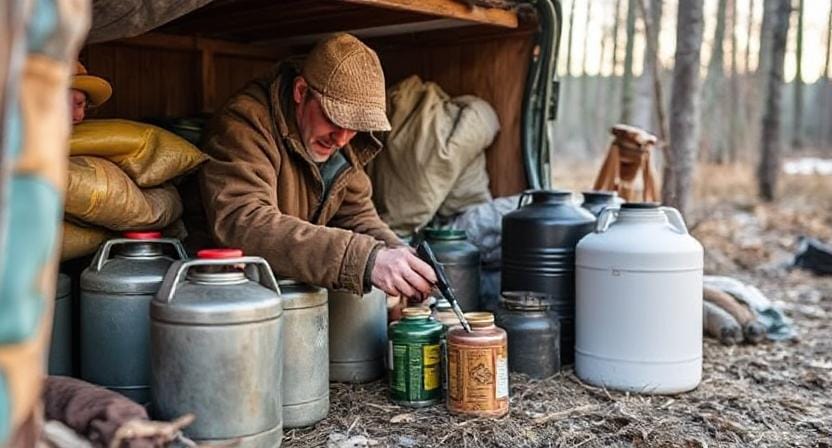
Okay, then! Now that we've chosen our favorite fuels from the list, let's speak about storage. Nothing says “disaster” like blowing up your garage by mistake while attempting to save money on gas.
Safety comes first! Always keep flammable substances outside in containers that are certified for storing fuel.
These containers are like small castles that keep spills and explosions from happening. You don't want your neighbors to think you're having a fireworks show.
When deciding where to put those containers, search for cool, dry places that are not in direct sunlight or near heat sources. The garage may seem like a good place to put them until summer comes. What would be best? It would be great to have a shed that is far away from any living spaces. You know, the kind that looks vacant every time someone walks by.
Also, be sure that kids and pets can't get to them! Believe me, no one wants their child to pretend to fill up their toy truck with petrol while yelling “vroom vroom!”
Keep Your Stockpile Fresh By Rotating It

You wouldn't consume food that had gone bad unless you had to (say if you were stuck in the woods with just canned peas), so why would you let your fuel stash go bad? This leads us back to rotation, the secret to preparation success!
Not only will you save waste by rotating your goods regularly, but you'll also make sure that everything is still useable when tragedy hits out of the blue (and trust me, disasters love to show up unannounced).
You may write the dates right on the containers or keep an inventory sheet somewhere easy to view (maybe next door where Aunt Mabel won't see it?) to keep track and not become a hoarder.
Just keep in mind that the expiration dates are different for each variety, and act accordingly!
More Than Just Fuel: Extra Supplies
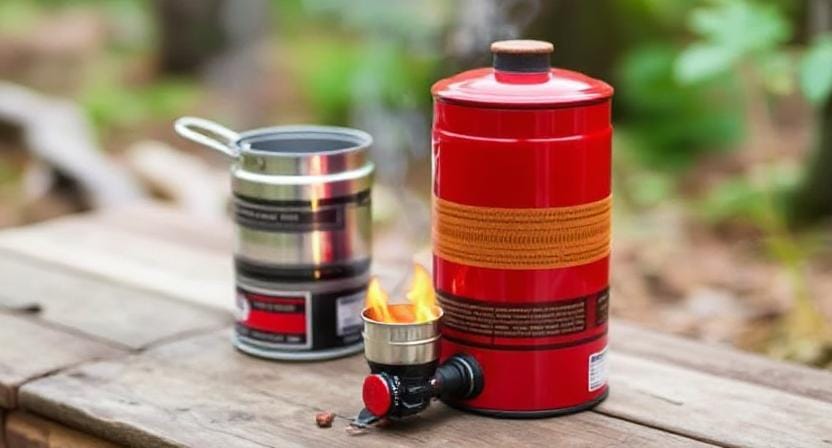
It's important to have enough supplies, but we shouldn't forget about other things we need. What good is all that gas if you can't cook food or remain warm?
Think about getting portable camping stoves that run on propane or small wood-burning setups that can boil water quickly. This is very important in case of an emergency! Also, don't forget to have matches and lighters next to your stored fuels so you can start a fire whenever you need to.
And let's see… if you can, think ahead about how you'll cook too! Canned goods are useful here because they don't need much prep work, unlike fresh foods that need to be refrigerated, which might not function during power outages.
Knowledge is Power, So Be Informed
Lastly, people, it wouldn't hurt to stay up to date on possible threats in your area! Follow local news sites for weather forecasts and emergency alerts all year long, since some areas may be at greater risk than others just because of where they are.
Using community resources like local emergency management agencies makes sure that everyone is ready together instead of feeling alone in the mayhem that will happen later on!
So, here's the deal. We've talked about getting a lot of gas, and it may be entertaining if you think about it. You know that a little planning goes a long way?
Think about this. You are in your garage, where there are nicely labeled cans of fuel all around you. Everything is in order for you. It feels amazing, doesn't it?
First and foremost, safety. You should always keep those cans out of the sun and heat. You don't want anything to catch you off guard. Fuel is strong, so treat it like a friend who can be moody. Give it some room.
Put on gloves when you fill those cans. It's a good thing to do. No one loves having sticky fingers or spills. The best way to live is to be clean and neat. And keep a fire extinguisher handy for added protection. Just in case. It's better to be safe than sorry.
Consider asking friends or relatives to help. Make it a fun task. While you clean out the garage, listen to some music. You could even have a snack after. That way, it feels less like labor and more like an adventure.
How about checking your gas every now and then? Just take a look at their labels. Check that the dates are correct. It's best to get rid of anything if it's too old.
Being ready might mean everything when something goes wrong. You don't want to be in a hurry when everyone else is freaking out. It's important to stay calm.
In the end, you're making sure that you and maybe even your family will be successful. You're making sure you have what you need when things go rough. And with a smile. It's okay to be ready and have a nice time while you're at it! That's great!
Frequently Asked Questions
What type of containers should be used for fuel storage?
Use color-coded, certified containers: red for gasoline, yellow for diesel, and blue for kerosene to minimize confusion and improve safety.
Why is fuel stabilizer important?
Fuel stabilizer slows oxidation and chemical breakdown, extending gasoline shelf life to around 12 months if stored properly.
Where should stored fuel be placed?
Fuel should be kept in cool, dry areas away from heat sources or direct sunlight to reduce vapor pressure and fire risk.
Why does ventilation matter in fuel storage areas?
Proper airflow reduces fume buildup and potential ignition hazards, especially in enclosed sheds or storage rooms.
How often should stored fuel be rotated?
Use and replace stored fuel periodically throughout the year to ensure your supply is always fresh and usable when needed.
Is it smart to label fuel containers?
Yes, labeling prevents mix-ups and helps track fill dates, type of fuel, and expiration timing for rotation cycles.
Can stored fuel be shared during community emergencies?
Yes, stockpiled fuel can support neighbors or group efforts, but always handle and transfer fuel using safe procedures.
Suggested Resources:
How To Prepare for an Emergency
https://www.ready.gov/prepare
Emergency Preparedness Guide
https://www.redcross.org/get-help/how-to-prepare-for-emergencies.html
Fuel Storage Guidelines
https://www.nfpa.org/education/resource-center/fuel-storage-safety

Kevin Collier is a seasoned survivalist and expert in prepping and homesteading, contributing to WiseSurvive.com. With a deep-rooted passion for self-sufficiency and outdoor survival skills, Kevin shares practical advice, strategies, and resources to help individuals prepare for any challenge. His informative articles cover a range of topics, from essential survival techniques to sustainable living practices, empowering readers to thrive in any situation. Whether you're a novice or a seasoned prepper, Kevin's insights will inspire you to take charge of your readiness and build resilience for the future.


